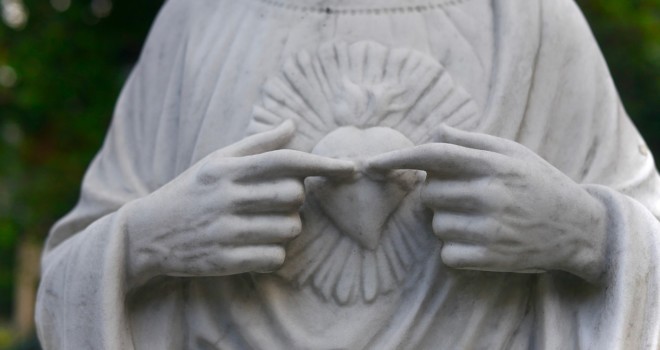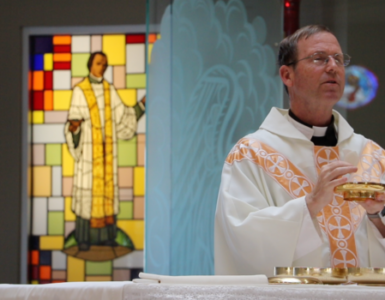It is not easy to forgive. It is more difficult to forgive when the offender does not apologize. It is much more difficult to keep on forgiving and praying for the offending party when they keep on knowingly offending us without any sense of repentance or remorse.
One reason why we find it difficult to forgive others, and to do so repeatedly no matter the cost or the results of our forgiveness, is because we focus on our own weak human nature and forget our new identity in Christ. We say to ourselves, “It is impossible for me to forgive like Christ is asking me to do because I am only human. How can God demand from me such unconditional love when I am so weak?”
Yes indeed, we are human and will always remain so, but we also have a new identity in Christ, the identity of one loved, forgiven, reconciled with God, and united with Him to the point that we share in His own unconditional love. We forget and ignore our new identity without realizing that we can only forgive when we live out of our new identity in Christ, irrespective of the weakness of our humanity.
Jesus doesn’t just ask us to be stoically passive by turning the other cheek in the face of unjust aggression, “When they slap you on one cheek, turn the other one to them as well.” He also does not just to act in denial and just love and pray for those who hurt and persecute us. We set ourselves up for frustration and hopelessness when we try to respond to His call to unconditional love simply by our will power.
On a deeper level, Jesus is asking us to live out of our true identity, that identity that we have in Him as children of God, “Love your enemies and pray for those who persecute you so that you may be children of your heavenly Father.” Our loving others unconditionally despite how they treat us proves who we truly are in Christ and it also makes us who we truly are in Him – children of God.
St. Paul also reminds the Corinthian Christians of who they really are in Christ, “Brothers and sisters: Do you not know that you are the temple of God, and that the Spirit of God dwells in you?” Being temples of God in Christ means that God dwells in us with His unconditional love, “The love of God has been poured into our hearts by the Spirit that has been given to us.”(Rom 5:5) It also means that God reigns in us irrespective of our strengths and weaknesses and He desires to act in us and through us and communicate to others His own love despite our weak human nature. This is the full reality of our being new creatures in Christ.
We live in a world that is actually steeped in the revenge mentality. The Irish poet Oscar Wilde once said, “Always forgive your enemies – nothing annoys them so much.” Even forgiveness can be used to get back at those who hurt us! We may not do evil directly to one who harms us, but we can easily respond to evil with evil acts or intentions when we live purely on our human level without any regard to our new identity in Christ. A painful example of this is when the life of the innocent child in the womb is taken to avenge the evil of rape against the mother.
What does it mean to live out of our identity in Christ?
First, we live out of our true identity in Christ when we believe deeply in God’s unconditional love for us. We refuse to doubt or question this love, no matter our sins and failures in life or the sufferings that we experience in the hands of other. This unconditional love is what allows us to be our true selves. We cannot love others unconditionally when we are rejecting our true selves.
Second, we constantly seek to experience and deepen this unconditional love of God for us. The sacraments of the Church, especially the Sacrament of Reconciliation, allows us to experience the merciful love of God that heals us and sets us free to love like Christ. We cannot communicate this unconditional love of God to others when we are not experiencing this love ourselves. Unrepentantly living in sin and doubting the merciful love of God for us leaves us with no hope to forgive.
Third, we begin to forgive ourselves for our past sins and failings. We cannot forgive others when we have not forgiven ourselves. We feel utterly powerless to love others unconditionally when we are full of regrets, blaming and condemning ourselves even after God has forgiven us. Difficulty or refusal to forgive ourselves makes it impossible for us to forgive others. In His name, we must forgive ourselves and let go of all regrets if we are ever going to communicate this selfless love to others.
Fourth, we strive to bring this love to others. The unconditional love that Christ asks us to reflect to others is the very same love that He alone offers to us. We are overcome by our human weakness because we think that this our pathetic, self-seeking, self-gratifying, self-indulging love is what Christ wants us to love others with. Nothing can be further from the truth. The one who calls us to love others unconditionally expects us to look to Him alone for this type of gratuitous and selfless love.
My dear brothers and sisters in Christ, human as we always are, Jesus has also offered us a new identity in Himself and He also wants us to experience the immense rewards of loving others unconditionally. We get absolutely nothing of supernatural value when we love in purely human ways based on our likes and preferences, “For if you love those who love you, what recompense will you have?”
But what is the recompense of loving others unconditionally, of choosing to love our enemies and to pray for those who persecute us? We begin to share in the “glorious freedom of the children of God.”(Rom 8:21) We experience that deep inner joy that “this world cannot give or take away from us,”(Jn 14:27) and “the peace that surpasses all understanding.”(Phil 4:7) This our vengeful world of wicked addictions, endless fears, and troubled hearts cannot imagine or fathom such rewards that come from loving others unconditionally from our new identity in Christ.
It is sure hard to forgive because it calls for a dying to ourselves. But it is possible and supernaturally rewarding. Our only hope is that the One who calls us to such radical love has first made us new creation in Himself by dying for us on the cross while praying for His executioners, “Father, forgive them for they do not know what they do.”(Lk 23:34) We do share in that pain of His on the cross as He won forgiveness for us; but we also share in His power to forgive others and pray for them because we are new creation in Him. Jesus alone can rightly demand such radical love from us because He alone can and has loved us so unconditionally and made us new creation by this love.
Jesus offers us this same unconditional love in this Eucharist. He does not take away our humanity or our weakness. We are human and we will remain human. But Jesus lovingly brings us to share in what He truly is in Himself – child of God and temple of God. May He abide, reign, and act in us and through us as His temples, so that we can radiate His merciful love to others no matter our human weaknesses. This is the only way that we can hope to share abundantly in His own freedom, joy, and peace in this vengeful world.
Glory to Jesus!!! Honor to Mary!!!
✠
Photo by Ryk Porras on Unsplash














